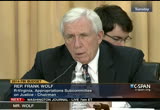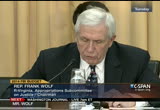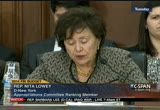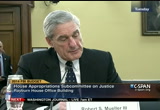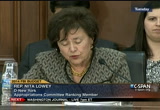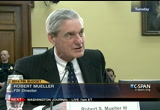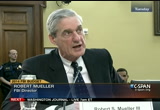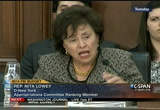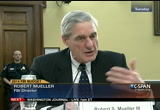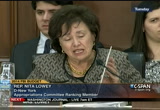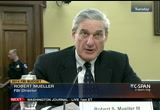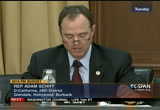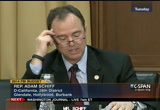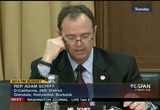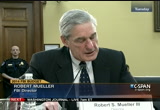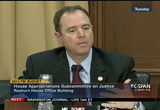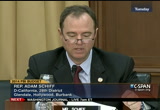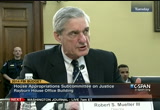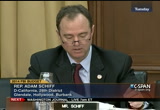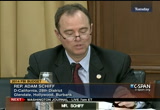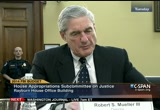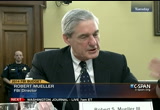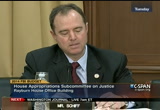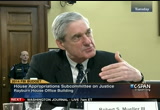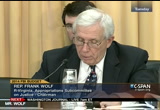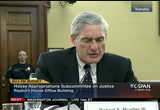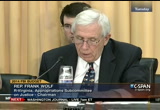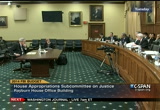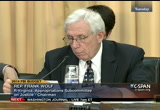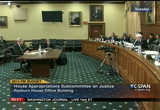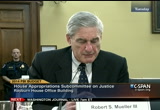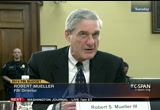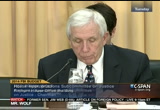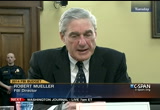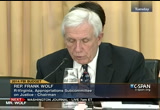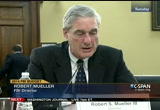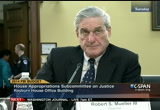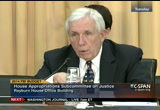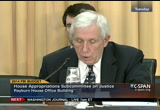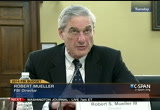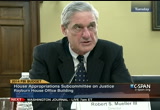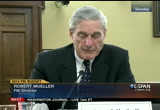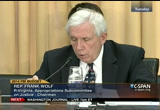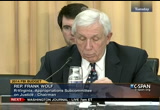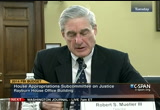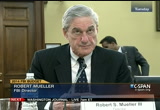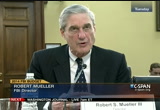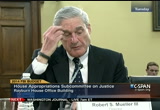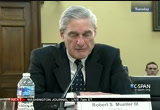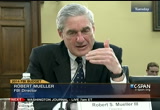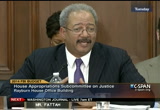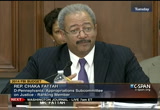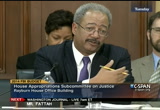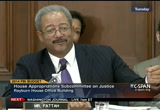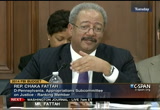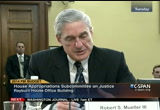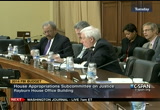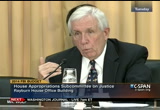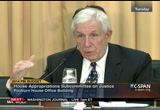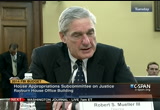tv Capitol Hill Hearings CSPAN March 20, 2013 6:00am-7:00am EDT
6:00 am
>> i am much more familiar with the somali community than the sudanese community. that is the first i've heard about sudanese gang members perhaps being recruited for work overseas. >> can someone look at it and let us know? we have heard a number worsening gang trends. unification of prison street gangs, alliances with drug- trafficking cartels, rapid cell phone use in prison, increasing use of a female facilitators. does that all ring true? >> yes and it has for a number of years.
6:01 am
>> is it growing or decreasing? >> i think it has grown over the last few years. i spent time in california, a number of gang members ended up with the pelican bay in northern california and ran their gangs from inside the walls. >> thank you, mr. chairman. director mueller, welcome. thank you for coming before the subcommittee today and i thank you for your service to the country and for your professionalism in running the fbi. the fbi operates the national and state criminal and background check system. we have to enforece the laws that we have.
6:02 am
even the momentary glance at the laws we have proves there are holes in our system that even with adequate enforcement would not keep guns out of the hands that seek to do us harm. i'm focused on the fact that those on the terror watch list do not raise a flag in the system. what are those on the terror watch list and not automatically denied a fire arm from licensed firearms dealer and should it person?s listing on the list be a factor in the denial of a firearm? >> the reason those on the terrorist watch list [indiscernible] one of the factors is listed in the statute.
6:03 am
there is legislation being discussed in terms of what more can be done to expand these prohibitive factors or to expand it and other ways the use of nix to bar the sale of guns. >> so a person can be on the terror watch list and yet we have to pass legislation to ensure that a person on that list can't purchase a gun. >> that is my understanding. >> the president has indicated he plans to devote additional resources in this fiscal year to help states provide more information to the federal databases used in nix background checks. how long do you think it will
6:04 am
take? how much funding to make the databases complete enough to have confidence that prohibited individuals are not able to purchase guns from licensed dealers? have you seen a greater effort by states since sandy hook? >> i would have to check whether we have seen an uptick in terms of the information from states. generally we do after something like sandy hook. it differs from state to state. i would have to get back to you on that. >> i'm concerned that the sequester could impact the ability of the fbi.
6:05 am
those who should be restricted from having access to firearms would be able to make the purchase. so what happens when a prohibited purchaser is able to complete a fire arms purchase because it takes longer than the three days to resolve the eligibility question? is the fire are retrieved from the individual? and how long does that take? had a substantial increase in requests for check since -- since sandy hook. throughout 2012 we had approximately 300 examiners addressing this. have had to put another 200 examiners on the list the next three and a half months because of the increase. nonetheless, we have still been ble to assure that 97% of the
6:06 am
requests were resolved within three days. to the extent that it does not get resolved and in the end gets resolved against the person having a weapon, then it is referred to atf and atf does go out to attempt to retrieve the pope and. .- to retrieve the weapon >> i have one other issue, because it came up at another hearing i attended. is last week the department of generalinspector spoke on the encouraging private businesses to invest in their own network security and to properly report incidents of cyber intrusions'. are you working closely and with the private sector? are they good partners with regard to sharing information that could help the fbi learned more about cyber threats and
6:07 am
vulnerability? if you could catch us up to date on what are the challenges? is it working? what else can be done? >> in the wake of september 11 in the counter-terrorism the realm we have found for us to be successful, we have to work cooperatively with state and local law enforcement. we have established joint terrorism task forces throughout the country. when it comes to the cyber arena, the key partner is the private sector. we have made headway with the private sector, but there are together thatking we have to overcome. one is liability, sharing information. that the issues are with regard to antitrust laws and private-sector gets together and shares the information and the shares it with us. there are issues relating to the ,oss of proprietary information
6:08 am
if they share it with the federal government. we're working through those. there is legislation pending to address this. if we are to be successful in this realm, we have to develop mechanisms telling information between the private sector and the federal enclave in order to anticipate and prevent cyber attack and then identify those responsible for the attacks and to make certain that they go to jail or otherwise. >> thank you. and thank you mr. chairman. there are questions about what can be done now and what can be done if we have the legislation theif we don't have information in the legislation, are we preventing you from the partnerships with the private sector. but we will save that for another day. thank you very much.
6:09 am
[inaudible] i've heard there's a growing concern about gangs pin the u.s. military. does d.o.t. participate in this gang intelligence center in and do they have access to the data as a tool to prevent gang recruited in the military? >> i would have to check as to what is their commitment of personnel assigned to the national gang intelligence center, if any. i do know i have worked cooperatively with the military to address gangs that may be on the street and also in the military, particularly at the bases where there is some indication that the gang activity is not delegated to adjust the community but also involves those assigned to a nearby military bases. have enhanced we
6:10 am
our cooperation in that regard. >> should i ask secretary chuck hagel if it makes sense for dob to participate over there? " i would have to establish order is a relationship. whether they have personnel and what we have to shore there is the exchange of information and intelligence. >> pipa thank you, mr. chairman. it's nice to see you, director. thank you for the superb job you been doing at the fbi for a long time. we have spoken in the past about using dna technology to solve serious crimes. 2007 was a time around /2008 when the crime lab had an enormous backlog of samples. it was a lot of work, but by using technology and with the support of this committee, the fbi has cleared the backlog. a report from 2010 found there was a substantial fbi dna case
6:11 am
or a backlog, but an update published in september found the backlog is now very low and well managed. in both cases, i commend you and your staff for their hard work in bringing that up to date. have no doubt that by improving turnaround time for dna evidence, that we are solving serious crimes and preventing additional people from becoming victims. there are many state and local crime labs around the country that have not been as successful as the fbi. i hope that you and the fbi lab can share the lessons you have with state and local governments. i want to touch on familial search, which we have talked about before. this is a method of searching offender dna database system determined its dna from a crime scene has a familial relationship with someone in the offender database. probably the best known case involved an l.a. serial killer, the grim sleeper, who murdered
6:12 am
at least 12 women over several decades. he was caught because of a real surge linked evidence from crime scenes to his son, led been incarcerated in california for robbery. introduce this again, asking the fbi to in supplement the bill -- the employment familial relationships search. there was a case in nevada that would still be open otherwise and potentially open forever and there may have been subsequent victims. we had a good hearing on the judiciary hearing on the bill last year and the hope we get to the bill on the for the congress for. last year when i spoke with you, you voiced support for the technology and you said your staff was exploring how to implement such a system including building software if you would use to estimate the likelihood of enfamil relationship. do you have any updates on the progress towards familial search
6:13 am
and the findings of the working group that has been studying it? do you still believe congressional authorization is necessary? >> let me start by saying as a prosecutor and law-enforcement entity, it would not be supportive of a mechanism such as this to identify a person particularly those persons that are responsible for such a random crimes. three things i should mention. your legislation which we did support and will continue to support. there were modifications last year. , without doing any research, that it would take some statutory assistance to push it through, because it is a somewhat controversial development or new technology. those concerned about privacy
6:14 am
rights have a substantial concern. the scientific working group on dna analysis, a working group of specialists from around the country has recommendations and we expect those to come out this summer perhaps in july. we will look at those and try to follow up on those. last, as you pointed out, we are looking at designing an algorithm that we could use at the federal level to conduct such searches and do it appropriately according to standards set up either by regulation statute. yes, we are tremendously supportive of this and will try to keep you apprised of each of the steps. >> any sense of when that technological work on the software will be developed? we have done it in california and a couple other states have. it's not that difficult. although there may be different policies in terms of how expensive or limited it should be. if any sense of a timeline?
6:15 am
>> i will get back to you. it looks like it's coming to a head this summer, the recommendations from the board. my hope is we will be able to take some action later this year. >> thank you. also on the subject of dna, i understand the fbi has invested in testing and validating the rapid dna technology. it is an emerging technology that puts a crime lab in the hands of law enforcement officers at the scene rather than waiting days or weeks or months to develop a dna profile. police officer with simple training can take a dna sample themselves and have a profile within 90 minutes. rapid dna was discussed at length by the supreme court recently during oral arguments in the case of maryland versus king. the concern that constitutionality of dna profiles upon arrest. the justices noted that the be helpful.ould
6:16 am
this is a technology many people are not yet aware of. but i know that under your leadership the lab in quantico has been participating in testing discussions. this could be a powerful tool. dna is the 21st century fingerprint. i also understand that dna identification act would currently preclude uploading a dna sample obtained using a rapid dna device into the national dna index system. do you expect the the problem will be asking for an amendment to that law to accommodate this new technology? about thet certain impact of that legislation and what the justice department is doing with regard to that legislation. we are testing two prototypes and will be adding another prototype this summer, i think.
6:17 am
the expectation is that rapid dna will eventually perhaps be at booking stations when you go in the same way you take a fingerprint. i would have to get back to you on the question of the impact for the legislation. >> i think currently you need an independent verification by an outside laboratory. it's not something that can be done in the 90 minutes in which you would or rapid dna test. i would think when the technology is ripe, we would probably have to work together and i look forward to working with you. >> i understand it's a catch-22. >> one last question, mr. director. in your testimony you discussed the ongoing theft of intellectual property and intellectual espionage. the much more public test of work of u.s.-based creators occurs every day of rampant piracy and counterfeiting. a subcommittee has supported
6:18 am
dedicating agents fanned assistant u.s. attorney to investigating and prosecuting these cases and i hope to maintain that commitment and i hope you will continue to make this a priority. they have a real cost in the form of u.s. jobs and economic activity. we've got a good reminder a few weeks ago in a study released by two economists. michael smith of carnegie and a professor at wellesley. this was following the seizure of megaupload into an area 2012 and the indictment of six its founder and several employees for criminal racketeering. researchers studied movie sales in 12 countries before and after the megaupload indictment and arrest. at one time it had been the 13th most popular sites on the internet when it went offline. sales of movies through legitimate sources increased by 6% to 10% following the closure.
6:19 am
they write that even though they shut down m megaupload, it did not stop piracy some consumers were willing to switch to legal channels as a result of the shutdown. helpied.mmittee has i want to thank you for your work. collaborate on these investigations. they have a real payoff. i see that very directly among my many constituents who work in this area. i just want to urge you to continue to make this a priority. >> we will. let me suggest something. we have in the cyber arena and private industry that is reluctant to cooperate with the federal government for a variety of reasons, not the least of
6:20 am
which is they will lose their information. it would be publicized. when it comes to intrusions and butt of intellectual, yes, secrets and the like, that private industry support us. there has been reluctant over a period of time. when it comes to movies and such, they're very anxious to provide us information and to ask us to pursue these criminals. my question is, why are they not together? intellectual property is intellectual property. it can be a movie, is on, a military secret, or it can be stolen fromat is the university research laboratory. it would seem to me that private industry would have, if you combine them. what we want to do is to enlist
6:21 am
the support of private industry and to work with us to address cyber attack. we talk about intellectual property cases on one hand and then we talk about cyber cases. they're not very different. we should look at them as one grouping and should have the support of private industry in those efforts. >> i agree. house stoleng our right from under us, some of it in very open forms in terms of i.t. test you can see on the internet and some invisible ink andugh cyber infiltration attacks. we need cooperation. both are equally devastating. both in the private and public sectors. the private-sector as concerns about liability.
6:22 am
at the same time, the private sector does provide information to government when it comes to the death of their products overtly. so why not provide the same cooperation with their intellectual property is being stolen covertly? i think we are pretty close. i served on the intelligence committee and are some remaining issues about to his responsibility is to remove personally identifiable information. i don't think that's an onerous burden. i think most of the large players, particularly in the telecommunications area, they are doing this already. they are sophisticated and have the ability to do it. we need to attack the public and private face of it. >> if you could urge your to betuents that -- concerned about --
6:23 am
>> it's not always the same industries. is nots overlap, but it always the same players who are the victims of as much cyber theft as the victims of the overt ip theft. going to miss the vote. i don't want to have you hang around, but the other members should feel free to go. .here may be a vote coming soon the fy-13 bill, which we hope will be enacted soon includes funding for you to procure a comprehensive external review of the implementations of the recommendation related to the fbi proposed in the report issued by the 9/11 commission during this review would also have an analysis of the fbi response to other emerging terrorism trends including the
6:24 am
influx of domestic radicalization. the language in the bill requires the submission of a report no later than one year after the enactment. i wonder if you have any comments? i think it's a very positive thing. it was a good amendment. bill we will say in the the fbi is encouraged to carry out the review to drop the experience of 9/11 commissioners and staff. i did not put the language specifically to say, but i would hope that when this passes that hamilton andk lee tim kaine to do it. i don't think we need another 9/11 commission. drawve the language and to the experience. i think those two individuals would be good. >> i would have to take a look at it. those two individuals have ofpherded all the elements the response to september 11 and
6:25 am
have the experience i would have to look and see what kind of review and where the staff comes from and the like. i would certainly consider it. >> it is not meant to be any criticism of the bureau. it said this act includes review for comprehensive of the recommendation related to the fbi that was proposed in a report issued by the national commission on terrorist attacks. then it goes on and says the fbi is encouraged to carry out this review to draw upon the experience of the 9/11 commissioners. i think both of them did a pretty exceptional broad job and both are good people. i commend you for your policy which has been in place since 2009 that prohibits non- investigative cooperation and with the council on american- islamic relations after the group was identified as a co- conspirator in the holy land foundation case.
6:26 am
last year i asked the inspector general to investigate a number of instances where field officers were not complied with this policy. i'm told this report will be released this spring. would you confirm for the record your policy prohibiting the non- investigative cooperation with care remains in place? >> it does. >> we have discussed with the council on american-islamic relations. for the last year asked the fbi has suspended any formal relations with the group. fy-13 appropriation act indicates support for that policy and direct the fbi to notify the committee should there be any violation of the policy. we have not received any notification. we assume there's been no violation of the policy. your field offices do know that that is the policy? >> yes. >> i saw an article today in the on syrian times"
6:27 am
rebels. i was in lebanon and met with your attache, and in egypt, two weeks ago, marin interviewing people pouring across the syrian border. there were telling us of their concern of some of the radical elements in the free syrian opposition. my sense is the administration has failed. they should've been involved very early. had they been involved early, certain activity would've prevented what was a potentially we spoke with christian sunni and alawite and they all were fearful of what could take place. in the new york times it announces that the main exile coalition elected a nationalized syrian-born american citizen to be the first prime minister of an interim syrian government, charged with funneling aid to rebels inside syria, offering an alternative to the government of
6:28 am
bashar al-assad, who's been a bad person. we want to see him go. man, andng this other information technology executive who lives in texas, and it goes on to say he is of kurdish dissent and may have seen a plus since he has been criticized for not reaching out to syria more. some council members say he was the choice of syria's muslim brotherhood, a group that had been banned and persecuted under the assad regime and that played a powerful role. then it goes on to say that mr. hito advocated for muslim americans as a representative of the council on american-islamic relations. concerningghtly particularly since i have all these different families of all
6:29 am
different denominations and faiths telling me of their concerns of what takes place with some of the people currently in syria. for aadquarters, the need new fbi headquarters has been in the news lately. received 35 proposals from developers and communities in the metro area interested in hosting a new headquarters building. can you bring the committee updates first with the circumstances that led you to pursue a new headquarters facility and then on the status of the effort, including an estimated timeframe for decision and the timing of an actual move? >> the reason for the new headquarters is because we have ourn -- outgrown headquarters on pennsylvania avenue. it is not the most
6:30 am
architecturally positive building. >> it's actually ugly, to be honest. [laughter] >> yes. ugly and still could be used, we would use it, but we have outgrown in. we have 20 entities that are spread around and our work is inhibited by not being in one place. that has driven us to look for new headquarters and it needed to be in the capital region and needed to be near metro and other transportation and to assure that it meets our security concerns. processhe course of the has pointed out there are 35 applicants or proposals that have been submitted. i am not certain of a timetable that gsa will follow. i will have to get back to you on that. i don't know how long it takes for them to go to the proposals. i would have to get back to you in terms of the process a follow and whittle down a site.
6:31 am
>> i have been very concerned that the senate language, without saying, targeted to go to a certain location. i would hope that you would make it clear to the gsa people that it ought to be open, honest, and there should be nothing but integrity. there's probably nobody in the government i trust more than you. and there ought to be integrity in the process and not have a political operation by using language in different bills to direct it in a certain way without naming a place, in essence the circumstances say to send it to a certain place. hopefully, as you talk to gs-8, you will make sure that you, because of the credibility of the fbi, want to be open and honest and for to be done in inappropriate ways. >> certainly. >> in addition to your headquarters project, i'm familiar with additional construction projects which will be funded from your fbi appropriations budget which had
6:32 am
for attending -- pending some time and specific the central records complex in quantico. can you describe the needs of these projects and give us an effort of the funding requirements and the status? >> out of the budget constraints, to the extent that , hopefully they will approve, we will have to look at monies from quantico that we will use and put them off for other funding. in terms of the records center, than has been something we have wanted to accomplish a number of years, to modernize in one place record retention. records are so important to the work we do. i will get back to you on where we are in terms of the funding on that. in the budget crisis, these are the things that are going to be affected. >> could be other two be part of
6:33 am
the package? >> i will have to get back to you. >> my understanding from reading the news is that whoever is , theysful, on the bid will have an opportunity to procure the spot on downtown washington headquarters. i wondered if you cannot do all three together. the needs of quantico and the record-keeping. now you will have to do them even more with the closing down of washington. >> i will after look at that. i see your point. >> i have been concerned about the lack of progress in bringing to justice those responsible for the attack on the u.s. facilities in benghazi last september. we are now beyond six months. fewer people experienced problems in getting access to the site initially.
6:34 am
and also problems in gaining access to interview subjects. you personally went to libya in january. we saw last week that an individual was being held in libya in connection with the attack and that the fbi was able to interview him in the presence of libyan authorities. are you satisfied with the pace and result of the investigation so far and cooperation you're getting from their government? >> there are hurdles at the outset. benghazi did not have a law- enforcement element to provide security and the ability to act assist inrtners or to developing witnesses. we have overcome many of those hurdles with the help of libyan authorities who have exhibited a willingness to support us in our investigation. and it is progressing. didd go in january and i meet with the prime minister who
6:35 am
assured his support. i met with him when he was here again in the united states last week. the question is not necessarily the willingness but the capability. we are working on that. the investigation is progressing. we have interviewed a number of witnesses in a variety of places that assisted us in putting together the picture of what happened. >> when i was in egypt two weeks ago i gave them the letter specifically asking president morsi to allow the fbi to interview the person who they have in custody. as the fbi been given access to the individual jamal in egypt? >> not yet. >> the committee, we give egypt -- secretary kerry announced a $250 million. if the fbi -- let me just
6:36 am
commend your people, your people were in tunisia waiting for five weeks, on the ground waiting the initial time. >> there were in tripoli for a long time waiting to go in. >> in tunisia as well. >> because of the attack on the embassy in tunisia on september 14, three days later. >> and we give to each of $320 million a year in federal aid. tunisia $320 million. think it is unacceptable. we lost four individuals who gave their lives serving our country and some. have been some the thought that our government will give that foreign aid to the morsi government and not have the fbi and being given the access to that individual to is
6:37 am
unacceptable. if you could keep the committee informed on the progress of the morsi government giving you access, i would appreciate it,. ann patterson told me she would raise it and she told me secretary kerry was going to raise it. i don't know if he did. if you could let me know in a week or two. >> i will do that. on friday, a federal judge in california declared the fbi oppose the use of national security letters unconstitutional,. i assume the department will pursue an appeal. do you have any comment on the fbi's use of national security national-security letters in a tool to protect national security? >> the arc critical tool. in terms of establishing
6:38 am
pren invasive or more extensive investigations. without the ability to get information quickly, we would be working with one hand tied behind our backs. notp ofhe department of justice, but i would assume i probably will appeal that opinion or that decision by the judge in san francisco. theow that sheas ruling so ppken. second circuit addressed the same issue and found that the statutebviated a constitutional issue. so it has been addressed elsewhere. my hope and expectation is that it is addressed either on appeal or by new legislation. it is an essential tool. >> how essential? what would be the circumstances if her ruling were upheld and
6:39 am
became the law of the land? would dry up a substantial number of our counterterrorism investigations and espionage, which rely on national security letters for not the substance of conversations but the fact of a conversation having taken place between two individuals, it would dry up our ability to get that information and would severely hamper our ability to undertake those counter- terrorism or espionage investigations. also in the cyber arena, where ,ou have countries like china if we're not able to utilize national-security letters, it would impact our ability to undertake investigations in that arena as well. was picked upthat ghraib,backing, abu
6:40 am
laden's son-in- law, was arraigned in federal court for conspiracy to kill u.s. nationals. why is this an appropriate approach as opposed to a military commission that congress created for trying enemy combatants? s would be thi difficult to get into an open session. there was some intelligence that we're note traveling certain at the outset to a country. the best vehicle for having a country detain a person is violence charges and having an interval red notice. that puts a country on notice that this particular person for which unnoticed has been issued
6:41 am
may be traveling and then is the basis for the detention of that particular person. in this particular case, the individual who was detained under that protocol. i do not believe that we would have had the ability and to attain this person without utilizing that process and then falling through. through.wing but the administration has used the bureau on benghazi and every time there's been a question asked, they usually say this is an open investigation and we cannot comment and the fbi is working on it. the thought that the administration killed an american citizen, and i support what they did, with a drawn missile -- drone missile, yet
6:42 am
ambassador who killed stevens and three others and wounded others are being apprehended by using the fbi. you really cannot go into downtown benghazi and knock on a door and say, hi, i'm with the fbi and get a warrant. it just seems like there are two different approaches being taken. was used on al- aulaqi who put out a publication. and i understand that. you don't have to comment. but benghazi is being treated as a law enforcement issue. if you want to comment, i would love to have that. >> i am not certain one should say that we are utilizing one
6:43 am
approach to the exclusion of the other. every one of these situations are little bit different. there are occasions where it goes one route, which is military detention out. there are others that go the judicial route. from our perspective, if we are conducting an investigation, since september 11, an ,nvestigation has developed initiate and develop intelligence first and then determine options afterwards. but the expectation is that we want to gain all the intelligence we can to prevent the next terrorist attack. but then you have to have an endgame on the individual on whom you have detained. there are a variety of options. i would say that each of those -- or these options are on the table whatever we address a situation like this and we choose the best that will maximize our ability to get intelligence but also to assure
6:44 am
that the person we have detained faces some charges will not walk out of a jail cell anytime soon. >> ok. just two more. last year we discussed domestic radicalization and the uptick in the number of attacks or attempted attacks by people radicalized in this country. what are the latest trends and what successes and challenges are you having in countering this perhthreat? right in saying it is an enhanced trend. we have been somewhat successful in stopping the larger attacks from outsiders. i will not say it will not happen. what we have seen, persons radicalized on the internet and , butps with some friends generally they are lone wolves andcalized on the internet
6:45 am
engaged in some form of activity. we have had a number of undercover cases where persons ,ave been investigated prosecuted, and -- investigated, gone to trial, and have been successfully prosecuted in this arena. these would be the lone wolves who aspire to undertake a tax. we have been relatively successful in utilizing the same investigative tools that we utilize for public corruption cases, white-collar criminal cases, in terms of obtaining the cooperation of people come in terms of utilizing surveillance, whether it be wiser or physical surveillance, for instance, in identifying the persons who present these projects -- threats. thwart theo
6:46 am
attacks. the harder it becomes to identify the individuals, because they're not reaching out to anybody else, which would enable us to identify and alert them. if so it is an increasing trend. we have been relatively successful. my hope is that our traditional techniques will continue to give us some success in this arena. shifting just a little bit from that, does the recent legalization of marijuana in colorado and washington state in the trend we are seeing, how fbi'shat impact on the and the dea, indirectly? you are involved in these cases. >> we do very little. we still participate in task forces and the like. i'm really not certain what if any impact it would have on the
6:47 am
work that we do endorse d.e.a. does at this juncture. >> you have had a long struggle to develop and implement the fbi case management system "the sentinel". can you bring the committee up- to-date on i the deployment datet, what is been deployed, and what challenges remain? have launched sentinel last july and has been successful. we did a study that will show in order to do our investigative report, we've cut in half the time it takes to do the 302. we're still integrating other databases so you don't have to cut and paste information from one to the other. i believe it was very well- fielded by those in the and we continue to every three
6:48 am
months or four months we have an upgrade that provides new versatility people in the field. the believe ultimately program was successful and it was done at or about the cost that was established for it a number of years ago. first of all -- >> i'm sorry, can i just add one thing i thought of? >> developing sentinel further and giving the agency tools as part of the information technology that is tremendously maintain.that we the budget constraints where we have to rein in what we're doing can adversely affect our ability to continue its development and give the agents, analysts, and worked for the tools they need in this digital world to stay ahead of those who seek to do us
6:49 am
harm. want to getut i did that said. craig huey had a distinguished career. i want to ask a couple questions, but i do know that you also served in the marines. i want to take the occasion to offer prayers to the families of the seven marines who died today in the explosion at explosive test center in nevada and seven others who were injured. i know the chairman shares that. >> i do. >> since this is our last public engagement, i want to make sure i say that on the record. but let me move to this point, these articles records have had ts havee articles 3 cour handled hundreds of terrorism cases. >> correct. >> this has been over a number of presidential administrations.
6:50 am
these courts have been able to properly adjudicate these matters and to do that within the constraints of our judicial system. that does not take away from any other procedures that might be available. as you explained, when we are operating in terms of international law and the way was particular individual be detained or to control. i commend the administration for its aggressiveness and getting this person and making sure that we can hold him and anyone else accountable for the attacks on 9/11 and other attacks that may have been planned by al qaeda. so the congress as a number of issues from time to time that come into play.
6:51 am
but i think all of us should agree that the work you've done and that the fbi has done since 9/11 really protecting the country against any massive domestic terrorist attack and all of your activities internationally has really been remarkable, because the agency, it was not its primary focus on 9/11. but as with much of the country, we have had to focus more intently on this issue. so i want to thank you. my final question is about the budget and appropriations from the department of justice. we imprisoned more people than any of their nation in the world through our state and federal prison systems. , they are now rising to be about 24% of the
6:52 am
deal day budget. you are at about 29%. it will continue to rise. at some point we have to think differently about what we are doing with people. i have constituents, i have family, i have children. we all want to be protected from dangerous people. society ought to be protected and people are involved in wrongdoing should be punished. country, and, as a that's why i mentioned the longevity of your career. you were a prosecutor, you have been running the fbi. you have a view of this from a lot of different perspectives. the committee as we go forward is going to be wrestling with these issues over the next decade. the more people we lock up, the more we put in prison, the greater share of the budget that will be taken up through it. at the same time, these agencies like yours that are trying to
6:53 am
protect our country from terrorism as your number one responsibility are going to be shrinking relative to this portion of the budget. the chairman's as the been the biggest supporter of the fbi that the congress has ever seen in terms of fighting for dollars. i have seen him in the private rooms and there are just four of always fighting on behalf of agency. country, do, as a you have any thoughts about to going forward how we make a clear delineation about who we might want to put in an expensive prison cell and spent tens of thousands of dollars a year to keep them locked up? and the others we might have to think about from a different approach in terms of seeking redress or punishment for their transgressions? it's a more philosophical
6:54 am
question, but i would appreciate your comments. >> it is a cosmic question. and theeak for the fbi necessity for -- and i thank the committee for the support, the subcommittee for the support you've given to the fbi, because the fbi has changed over time. of ways of number resolving a particular case. one may be imprisonment and one may be deportation. house arrest. there are a number of particular dispositions. my concern is, as we go through the next three years that the american public, congress, the administration understand that the fbi has to change with the prospects and -- change with the
6:55 am
beings and that means able. we have to prioritize and make certain that we prioritize our largest threats, whether it be mortgage fraud or fraud on wall street or public corruption or civil-rights abuses and make certain that we prioritize and make sure we are focused on the greatest threats to the american public and then to the extent toere is a determination as what the ultimate resolution is, that's up to the judge's. >> thank you. i appreciate his question. what we're going to do is introduce a bill and i will ask your comments on it, after the recess. it will be bipartisan, it will be the two of us, to set up a national commission made up of
6:56 am
expertsrison particularly in the state's, many of them very conservative had to responde to the prison crowding more from an economic issue than any other. it will be bipartisan. we're looking for a chairman of stature or somebody who can take a year to come back and report. i think our present system is dysfunctional in the sense that very few people are working in the prisons. the prison industry program has been decimated partly because of congress. we have tried to get the bureau of prisons to adopt programs to allow them to make products that are no longer made in the united states. cape's only two baseball manufacturers now left in the united states. every baseball team, every
6:57 am
are made inse america. i hope they are barred from an american company. what do you think about having a orional commission not right left. i'm a conservative republican. i think he's a liberal democrat. i think he can talk for itself. to really look at this been. -- this thing. we will have to talk to mr. fattah. but a great person would be chuck colter. he went to prison, became a believer, spent his christmases and easters in prison right until his death he was visiting the prisoners. i have seen him with prisoners and there really loved him because he cared. most people get out of prison
6:58 am
and run away. what are your thoughts about putting a bipartisan commission to look at what to do? in the reprogramming, a large portion of the money that we approved, $118 million, came from the fbi to give to the bureau of prisons. what are your thoughts about looking at what do we do? are we doing it the best way? should there be reallocation? should there be drug treatment? what do we do? is theve not -- this first i've heard of it. i think an independent look would not hurt at all. by independent, i mean independent objective to look at certain aspects of incarceration. there are two challenges -- who what.d do it and
6:59 am
it would be a specification so it's not a wide-ranging enterprise or initiative without the possibility of coming back with some recommendations that can and should be adopted. verying smaller with a specific defined set of goals and parameters and an independent look would hurt. >> with that, that's my last question. times probably the last you will testify, before this committee. i was called off the floor yesterday and the guys said i understand director mueller will serve two years, what's your position? he said it will take a bill. i said, if they do, i will speak for the bill. but i think you ought to talk to mrs. mr. mueller first before you present this. >> exactly. >> thank mrs. mr. mueller
100 Views
IN COLLECTIONS
CSPAN Television Archive
Television Archive  Television Archive News Search Service
Television Archive News Search Service 
Uploaded by TV Archive on

 Live Music Archive
Live Music Archive Librivox Free Audio
Librivox Free Audio Metropolitan Museum
Metropolitan Museum Cleveland Museum of Art
Cleveland Museum of Art Internet Arcade
Internet Arcade Console Living Room
Console Living Room Open Library
Open Library American Libraries
American Libraries TV News
TV News Understanding 9/11
Understanding 9/11